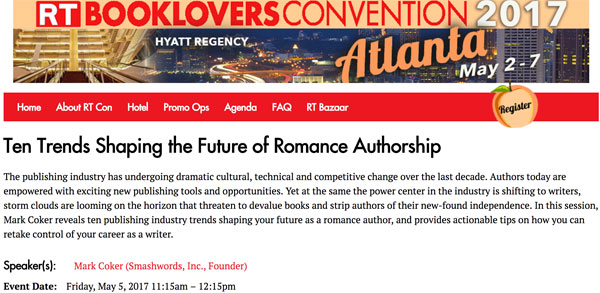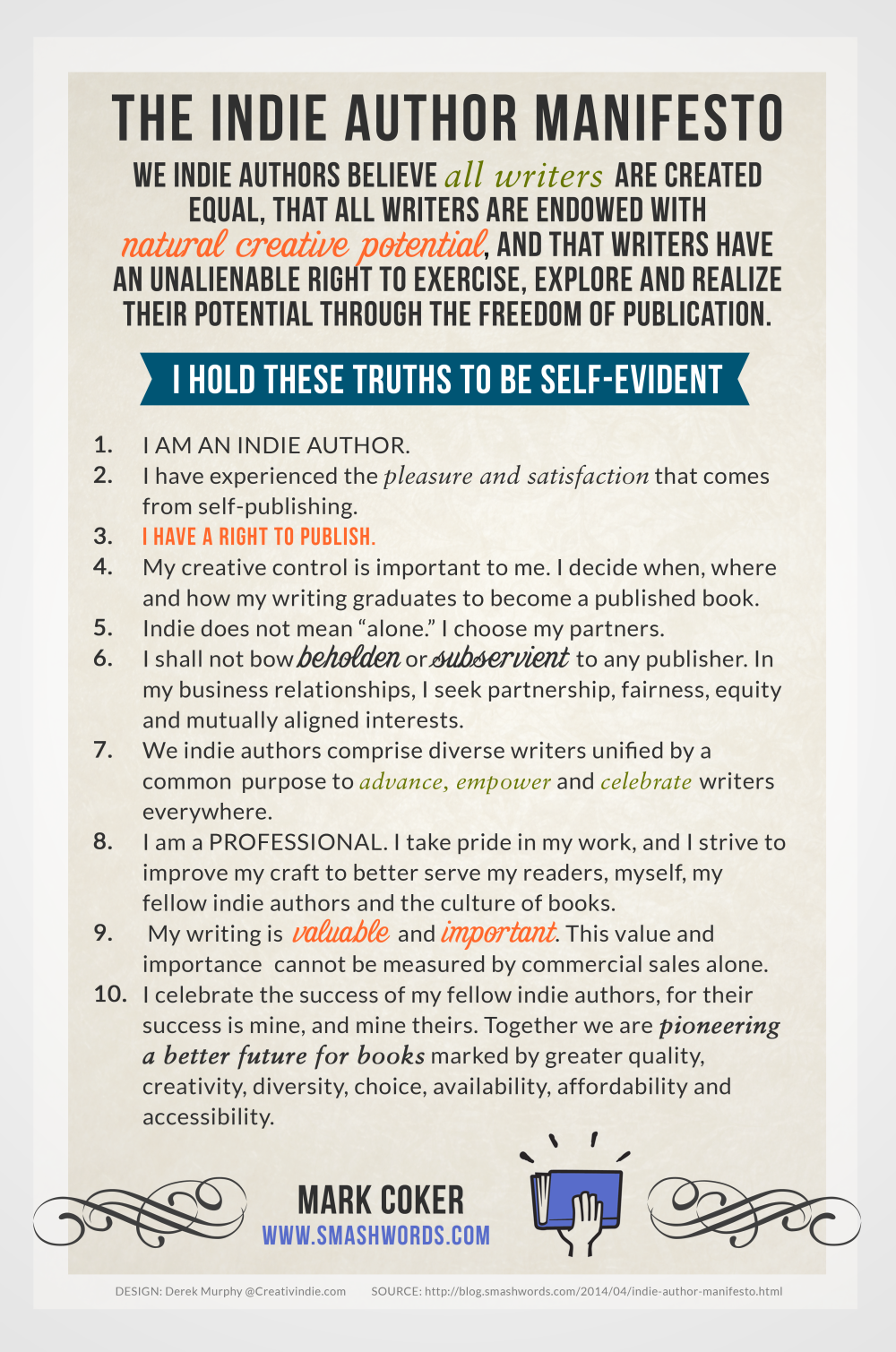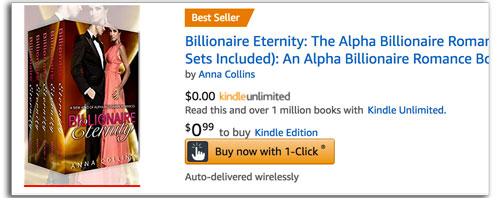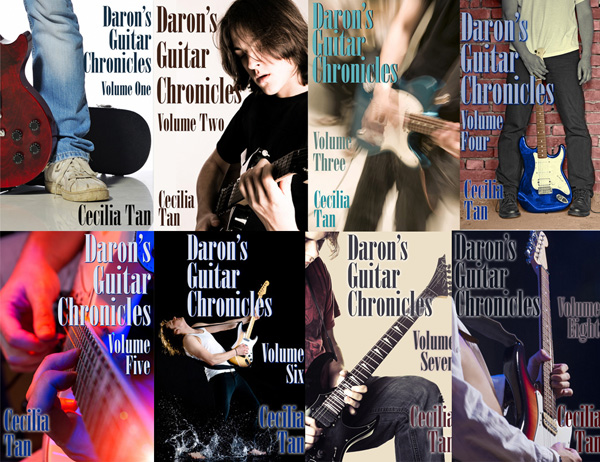
I’m at RT Booklovers this week, which is one of the largest reader/writer conferences out there. RT started life as “Romantic Times” but it now encompasses all commercial fiction genres including YA, mystery, women’s fiction, science fiction, and so on, but retains a strong romance focus. One of the major forces that has reshaped the book industry, and the romance genre in particular, of course, is ebook publishing and ebook SELF-publishing. A major figure in that revolution over the past ten years has been Mark Coker of Smashwords, one of the early self-publishing platforms and not only an online retail store but a distributor to the other retailers (Kobo, Apple, B&N, etc.)
Mark always has insightful things to say about the state of the ebook market, and later today he’ll be unveiling the annual Smashwords data survey, where they slice and dice the big data of what’s happening in sales across all retailers that they can see. But his earlier session today was “Ten Trends Shaping the Future of Romance Authorship.” With Mark’s permission I’ll now present you those ten trends as a listicle.
(Caveat: This is very close to verbatim what Mark said, but as a typist I can only capture about 60% to 70% of the true transcript, and any errors you may find in here are purely mine.)
Mark Coker: So much news happening every day, every month, it can be bewildering, and it’s easy to mistake ephemeral news for trends. Today I’m going to talk about firmly entrenched macro trends that are going to persist for a long time. These are what are driving your threats and opportunities in publishing forward. Some may be obvious, some may not. These may provoke some strong feelings. These are some important issues that should provoke greater discussion so please share this information widely:
1. Rise of Ebooks
Screens are the new paper. Until about 2012-2013 we saw exponential growth in ebook sales. Overall now ebooks are 25% of the retail book market (in terms of units). In romance ebooks and self-publishing are a much larger portion than in other genres, and if we look at the amount of time spent reading or pages read on screens (rather than unit sales), 50% of all pages are now read on screens. But growth has slowed and we’ve reached a print/ebook equilibrium now. Ebooks are going to continue to be a top choice for many readers. Instant delivery of reading pleasure is what continues to drive ebooks, along with low prices and huge diversity of choices, and convenient sample and purchase selections.
All authors are indie authors because you have the freedom to choose whether you indie publish, trad publish, or hybrid.
2. Democratization of the publishing process.
The gatekeepers used to control the entire industry. Publishers were the gatekeepers at the pearly gates of authordom. But because of digital, publishing is now democratized. You also couldn’t have a million books in a store, meaning distribution was artificially constrained by the footprint of the store. But shelfspace online is free/cheap and unlimited. Even if your book doesn’t sell a single copy, every retailer wants to keep your book “in stock.” It’s the reader judgement that matters more than others. Readers are the gatekeepers now. The best practices knowledge has also become democratized. You’re learning how to become a more professional author and publisher. Authors are starting to wonder what they need a publisher for and this is pushing publishers to be better partners to authors.
40% of all sales via the Apple store are in other countries.
3. Ebooks are going global.
Free from the logistical limitations of print, it’s now possible for readers around the world to have access to millions of books. Kobo was the first to go global. Apple was in 51 different countries. Amazon is now in 14 to 200 countries depending how you count. Smashwords is in every country we can reach. 90% of what is at Smashwords is English, but 40% of all sales via the Apple store are in other countries. As these retailers build out their global footprints, ebooks on sale in them will grow, too.
Being pro-author doesn’t mean being anti-publisher.
 4. The rise of indie authorship.
4. The rise of indie authorship.
Self-publishing has been around for a long time. Dan Poynter published his self-pub manual for decades (before he passed away a year and a half ago) but it’s really the ebook revolution that changed indie authorship and made it the most viable. Being pro-author doesn’t mean being anti-publisher. I wrote an indie author manifesto about how every writer deserves to be a published author. Every writer deserves to have a chance to be judged by readers. The manifesto talks about the professionalism that indie authors have. Don’t let anyone tell you you are an amateur if you have the knowledge and capabilities to do it. All authors are indie authors because you have the freedom to choose whether you indie publish, trad publish, or hybrid. Some in the indie community have tried to turn it into a religious war against the publishers. That’s toxic. There are plenty of reasons publishers can be criticized, but all options make for a more vibrant publishing ecosystem. In the early days of Smashwords we had some early authors in 2008 and 2009 who hit the NY Times list and then were recruited away by the publishers. At first I was sad about losing them but then I realized it’s really a reason to celebrate. How many here are already self-publishing? (*most hands raised*) How many here are considering self-publishing (who haven’t before)? (*a few more hands raised*) A few. Self-publishers love that they have total creative control. They have faster time to market. They keep all their rights. You can go global without having licenses divvied up all among various markets as if it’s a print world. You have access to the same professional grade tools that the big publishers do. You have lower expenses than a big publisher. You can offer your customer a lower-priced product than the big publisher and earn a higher royalty. You earn from 60 to 80 percent of the list price as a royalty per sale. A trad published author earns 17% to 20% in royalty (25% on the NET, not on the list price).
5. Indie authors are hitting all the bestseller lists.
It used to be only every once in a while that a self-published book would hit the lists. Now it’s commonplace, almost every week. I know the NY Times has screwed up their lists a little bit for romance, but this trend isn’t going away. I truly feel indie ebooks are going to dominate the ebook bestseller lists in the future. The larger macro trend here is that indie ebook authors will continue to use their strategic advantages over big publishers. You spend 24 hours a day thikning about your readers. Your publisher can’t do that.
6. The stigma on self-publishing is melting away.
In the olden days self-publishing was “vanity publishing.” Ten years ago the thinking was that only publishers could decide which books were good enough to publish. The idea was you took your rejection and you worked harder on another book and another book until you wrote one good enough to get published. That was hogwash. It was toxic. The authors who published themselves with Smashwords in 2008 are my heroes for breaking free of that mindset, for daring to publish themselves. Some of those romance authors achieved commercial success with books their publishers had given back to them as “worthless.” Those romance authors were the first ones who showed us you could self-publish with pride, professionalism, and commercial success. That’s what is causing the stigma to melt away. Jamie Maguire was one of the indie authors who hit the Times list with Beautiful Disaster, then worked with a publisher. She really appreciated what they did for her, but then she decided to go back to self-publishing. She felt she could serve herself and her readers better with self-publishing. It’s great to have this freedom to choose. Others feel very disillusioned by the publishers. 25% on the net is too low. Publishers need to raise their ebook royalties. They’re still too slow to market. Kristin Ashley was another one couldn’t even find an agent, much less a publisher, but she was judged by readers [to be a commercial success]. Work with publishers and your agent to make sure you have a reasonable reversion clause so you can have your books back in the future when the publisher is no longer actively supporting your book. Again, they can’t love your book as much as you do.
7. The glut.
We’ve reached a point where there are nearly unlimited numbers of good quality low priced ebooks. Everyone and their cat can–and has–become an author. No really, we have cats who are authors at Smashwords. (*laughter*) The supply of product is growing faster than the supply of customers. The trad publishers are starting to come down in price as a result. (Author’s note: but some Big 5 publishers still have $12.99 and $9.99 prices on their romance ebooks, which is nuts IMHO.)
The other ebook retailers are slowly being bled dry.
8. Amazon is driving massive devaluation of ebooks because of this glut.
Take what I say with a grain of salt: I’ll try to be nice about it but I’m about to rip into Amazon. A lot of people don’t understand the brilliance of the Amazon business model: lowest possible prices and largest possible selection. It’s great as a customer to have that and their great service. But they also have KDP Select, their opt-in self-publishing option where you give them exclusivity for 90 days in exchange for better placement in the Kindle store. We don’t know how many books are in KU at any given time but it’s over a million books and is probably more than three million books. That’s a million reasons for customers to abandon other retailers and only purchase at Amazon. The other ebook retailers are slowly being bled dry. Amazon doesn’t have to make a profit on ebooks. They can keep squeezing the suppliers to keep offering their customers lower and lower prices. If you, the author, are the publisher, you can’t outsource your writing to a cheaper labor market like China. You still need to put food on your table. If the dominant ebook retailer–Amazon has 70% of the market–forces you to take less money, they are bullying you. They are bullying you into making your book more discoverable and more attractive to Amazon’s customers for the tradeoff of choking off the supply to other retailers, and forcing you to take a lower price than $2.99 or even 99 cents. Here you’ve finally achieved independence from the publishers and then bam, now you’re giving your independence back to Amazon.

9. Kindle Unlimited
KDP Select/Kindle Unlimited is undermining the single copy sales of ebooks. One single copy sales you’re earning 60-80 percent of the list price. Not in KU. They are training the largest community of readers out there to read for what FEELS LIKE FREE. Even 99 cent books start to look expensive when you could read for free. At Amazon on the retail page the largest thing you see says “Read this book for free” with Kindle Unlimited. Now your amazing romance readers, who read more than a book a day, can just pay that $9.99 a month to Amazon and never pay for another book again. Even if you read five books a day you never run out of books at KU. I’ve already heard from Smashwords authors who have heard from readers “I won’t read your books unless you make your books available in Kindle Unlimited.” Millions of readers are being trained to think your $2.99 ebook is too expensive, and then the other level of devaluation is you are also being paid less. Amazon pays you out of the monthly pool with page reads. Yes, they make that pool bigger and bigger but they offer you less and less and put more restrictions on what you can do with your books. Amazon HAS to do that because their business model IS to offer the lowest possible prices for the largest selection. It makes it impossible for the other retailers to compete. As a reader, how many reading hours to you get per dollar spent? With KU you get more. The slippery slope has started and the only way for other retailers to compete is going to be to do the same thing and keep paying you less.
So you may be asking, are we all screwed?
10. Indie authors are writing the next chapter for this industry.
YOU decide when, where, and how you publish. And it’s the collective decisions of everyone in this room over the next 24 months that determine the course of this industry for the nexy generation. That will determine if the sell-per-copy ebook retailers are going to survive. If there are only one or two sellers of a product, they will control your destiny. First let’s talk about the good news: indie authors are continuing to capture larger and larger parts of the reader market and you have access to those readers that you didn’t have ten years ago. Let’s celebrate that the power center moved from publishers to authors. But the bad news is that authors are surrendering their independence to KDP Select/Kindle Unlimited. Every book that goes in there is a vote to kill off the other retailers and a vote to surrender your independence. It’s hurting Amazon’s pure play retail competitors. Kobo and Barnes & Noble are very committed to you. But because their businesses are under stress, they can’t invest as much in you as they might want. So you may be asking, are we all screwed? And I mean that in a bad way! (*laughter*) Are we all going to become zombies leaving a sticky trail of unfinished adult coloring books in our wake? (*laughter*)
It’s partly up to us what happens. We lamented how Walmart moved in and put our local businesses out of business. We lamented how our manufacturing jobs moved to China. But it was to feed our gluttony. Amazon just feeds our gluttony. They do it to the big distributors and they do it to us. Squeezing their suppliers is the only way their business model can work. You as an author are relegated to the status of commodity producer. Commodities are indistinguishable from each other. You write a unique book, but reading is subjected to commodification. Reading is pleasure and experiences, and if there are so many great books out there, they will find another writer to go to. When Amazon launched KDP Select in 2011, I wrote a blog post that day saying it would lead authors to being tenant farmers tilling Amazon’s soil. You want your own soil and not to lose your independence. We fed the pet tiger that we knew would grow up to be a predator. We need to tame the beast. We need to say no to exclusivity. Authors and publishers must diversify sales channels. Amazon can suddenly crush you in the night when they roll over and change their algorithm. They can bury you so no one can find you. Publishers need to be more author-centric. Publishers are a service-provider to the author. They need to abandon the idea that only certain books are worthy. They are losing the pipeline of new authors. I’d like to see publishers adopt the best practices of self-publishing platforms so they don’t die off. Yeah, it would be great for my business if all publishers went out of business because it would drive authors to Smashwords, but I want a healthy ecosystem where we can all thrive.
Think long term. I have authors who tell me they hate KDP Select but they tell me they have to provide for their family and they need the bird in the hand instead of two in the bush. As an author, though, you have to say no to anyone who wants to take away your independence. Be paid for your own work, decide your own prices, don’t be limited where you sell. The more retailers in the world the better. Even if you never work with a trad publisher, the fact that they are out there is good for you. You may need them later.
Author asked a question question: I have eight books out there right now that were selling well on Amazon, but they changed the algorithm on February 28 and buried me. Sales dropped to 10-12 percent of what they were. So I put one book into KU on May 1st hoping it would help my name pop up again because I was desperate.
Mark: I understand that. But you’re poisoning the well. You cut off your other retailers and hurt them. Kobo and Barnes & Noble need your help because they don’t have another business. Apple will be fine because they have more money than god. So do Google even if they don’t know what they’re doing. But for the retailers who depend on ebooks it really hurts them.
Eventually what’s going to happen is only authors who PAY to be read on Amazon will be read on Amazon. Authors have been subsidizing the trad publishing industry for decades. Most writers in trad publishing couldn’t live without also having a day job. So publishers depended on not paying them enough to actually live. This is even worse than that.
Amazon makes it tricky. They make it seem like you have to be in KDP Select. Every step of the way there are check boxes and things that tell you “don’t you want to make the most money? click here.” Some authors don’t even know it’s optional. (And some customers don’t realize they can pay for the book instead of joining KU, too. -ctan)
Promote all retailers on your websites, not just Amazon. Have links to all the others.
Author question: But the reason we link to Amazon from our websites is because Amazon gives us a kickback with affiliate links. Does Smashwords do that?
Mark: Smashwords offers a commission but we are a small store. Our store pays the highest percentages, up to 80% list, so that’s the way we do it, you set your own price, your own percentages. I know Kobo and Barnes & Noble supposedly have affiliate programs also.
Author: They do but they’re much more complicated. You have to set up a Rakuten Linkshare account and it’s nowhere near as easy as Amazon makes it.
Mark: They need to make it easier for authors if they’re going to continue to compete. That’s an easy thing they could do.
Author question: What alternative are there in print to using Amazon’s Createspace?
Mark: Ingram Spark is the best POD alternative to Createspace. Ingram is the biggest book distributor in the world and they’re great people. They’re the old publishing world but with Spark they are moving into the indie world.
(That was all we had time for. I’ll be back to see the results of the annual Smashwords data analysis later today!)


Thanks for this!!
Yr welcome!